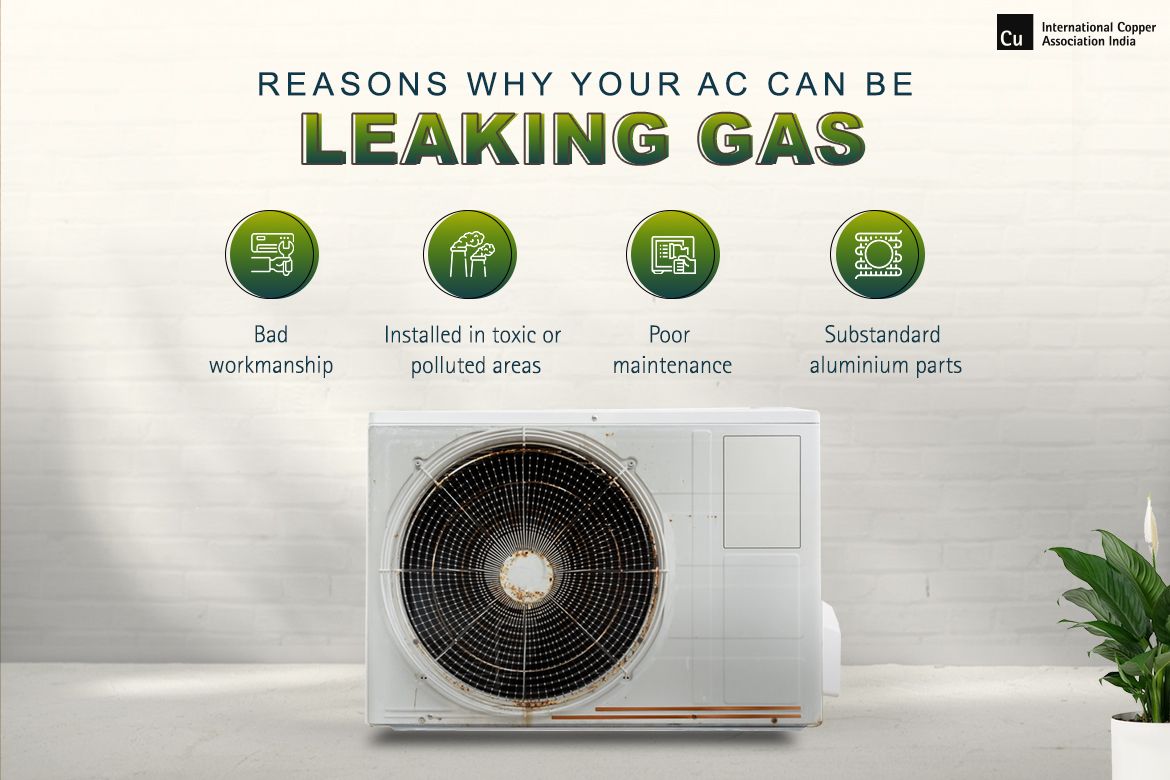Copper in Air Conditioners: Minimum Leakage, Maximum Performance
Copper has been a key material in air conditioners (ACs) for a long time — preferred for both, its reliability and durability. Over the years, manufacturers have continued to trust copper components owing to their minimal leakage rates and ability to withstand extreme conditions. Today, copper ACs have a 98% market share. As air-conditioning systems evolve to meet the demands of sustainability and energy efficiency, the role of copper has become even more significant, ensuring maximum performance with lesser environmental impact.
Copper’s exceptional thermal conductivity ensures that the refrigerant in the systems can absorb and release heat more adequately. Moreover, copper’s ability to resist corrosion makes it ideal for long-term use in AC units, more so in locations that experience fluctuating weather conditions.
Reduces Gas Leakages
One other advantage of copper in air conditioners is its ability to minimise refrigerant leakage. Refrigerant is the working fluid in an AC system, responsible for transferring heat from the indoor space to the outside. When refrigerants leak, it not only diminishes the system’s productivity but also contributes to environmental pollution. The use of copper tubing significantly reduces this risk due to copper’s strength and resilience. Copper tubes can be easily bent without breaking, allowing for a tight seal in critical components like the condenser and evaporator coils. This results in reduced cooling agent loss over time, which not only helps in maintaining the system’s performance but also saves the environment from gas leakages.
Energy Efficiency
In today’s world, energy efficiency is a top priority for both consumers and manufacturers. As air-conditioning systems consume a substantial amount of energy — accounting for around 3% global carbon emissions — improving their efficiency is critical to reducing overall energy costs and environmental impact. Copper’s high conductivity ensures that heat is transferred quickly and efficiently, allowing the AC to cool a room in less time. This not only translates into faster cooling but also lowers the energy consumption, ultimately reducing electricity bills. When paired with modern technologies such as inverter ACs, copper components can further optimise performance, ensuring that the unit operates at its most efficient levels even under variable loads.
Durability and Longevity
Another benefit of copper in AC systems is its durability. Copper tubes are highly resistant to wear and tear, corrosion, and extreme weather conditions. This ensures that the air conditioning system has a longer lifespan and also requires fewer repairs and replacements. In comparison to other materials like aluminium, copper proves to be far more durable, which results in less frequent maintenance and a lower overall cost of ownership.
Enhancing Sustainability
As the focus on sustainability intensifies all over the world, the use of copper in air conditioners aligns with the global push for eco-friendly solutions. copper is a recyclable material, and its long lifespan reduces the need for frequent replacements, contributing to a reduction in waste. Additionally, by minimising leakage and improving energy efficiency, copper-based air-conditioning systems contribute to lowering gas emissions, making them a more sustainable choice.
Copper: The Future of Sustainable Cooling
Copper enhances the efficiency of air conditioners, reducing energy use and emissions. For consumers, this means lower energy bills and a smaller carbon footprint. Copper being 100% recyclable makes it the champion for sustainable cooling.
But, from a broader perspective, we need to continue banking on copper’s vast potential in creating a more energy-efficient future for cooling technology, especially as the demand for air conditioning is set to triple by 2050.
Sources
https://eta-publications.lbl.gov/sites/default/files/lbnl-2001229_final_0.pdf


